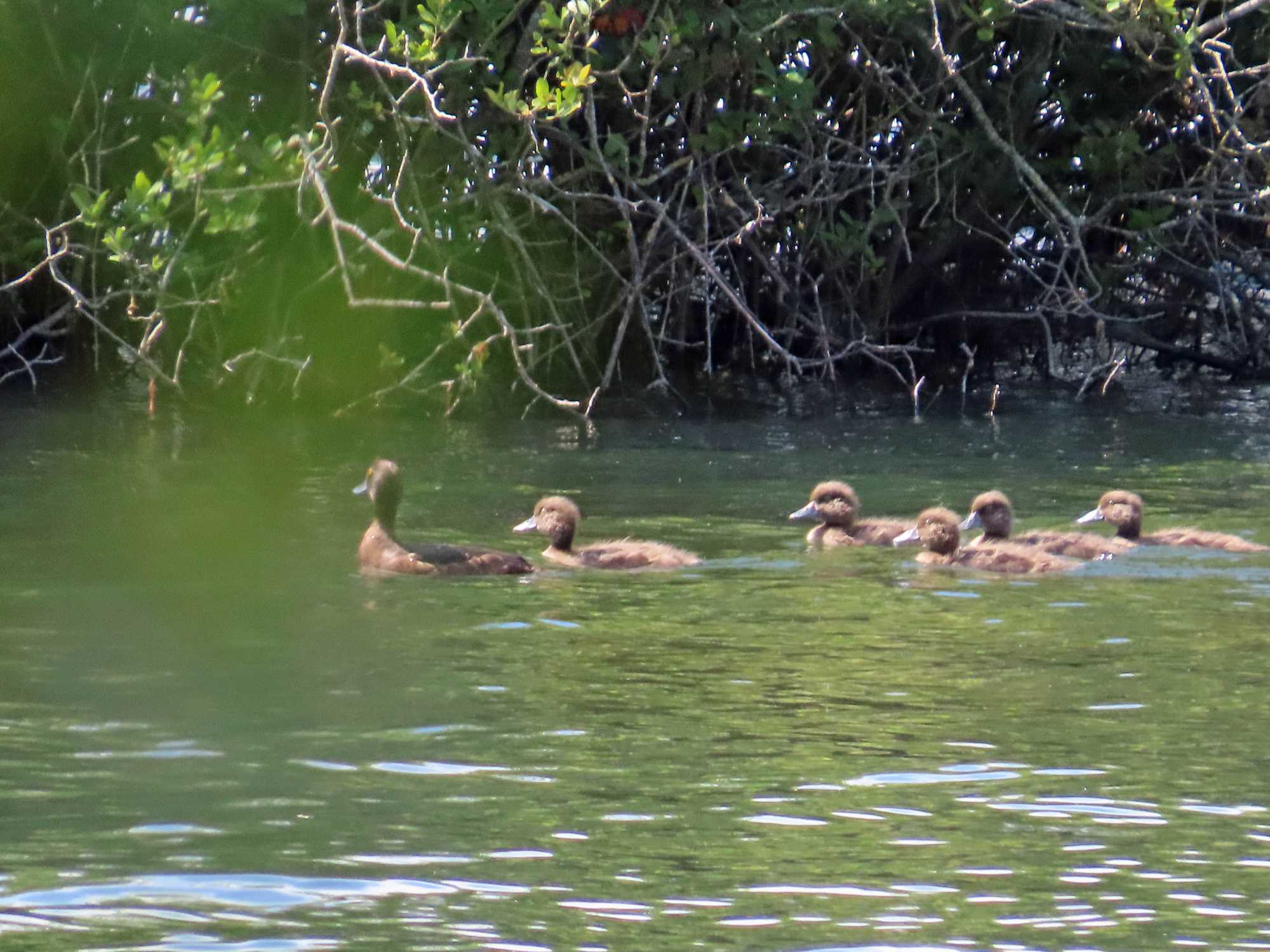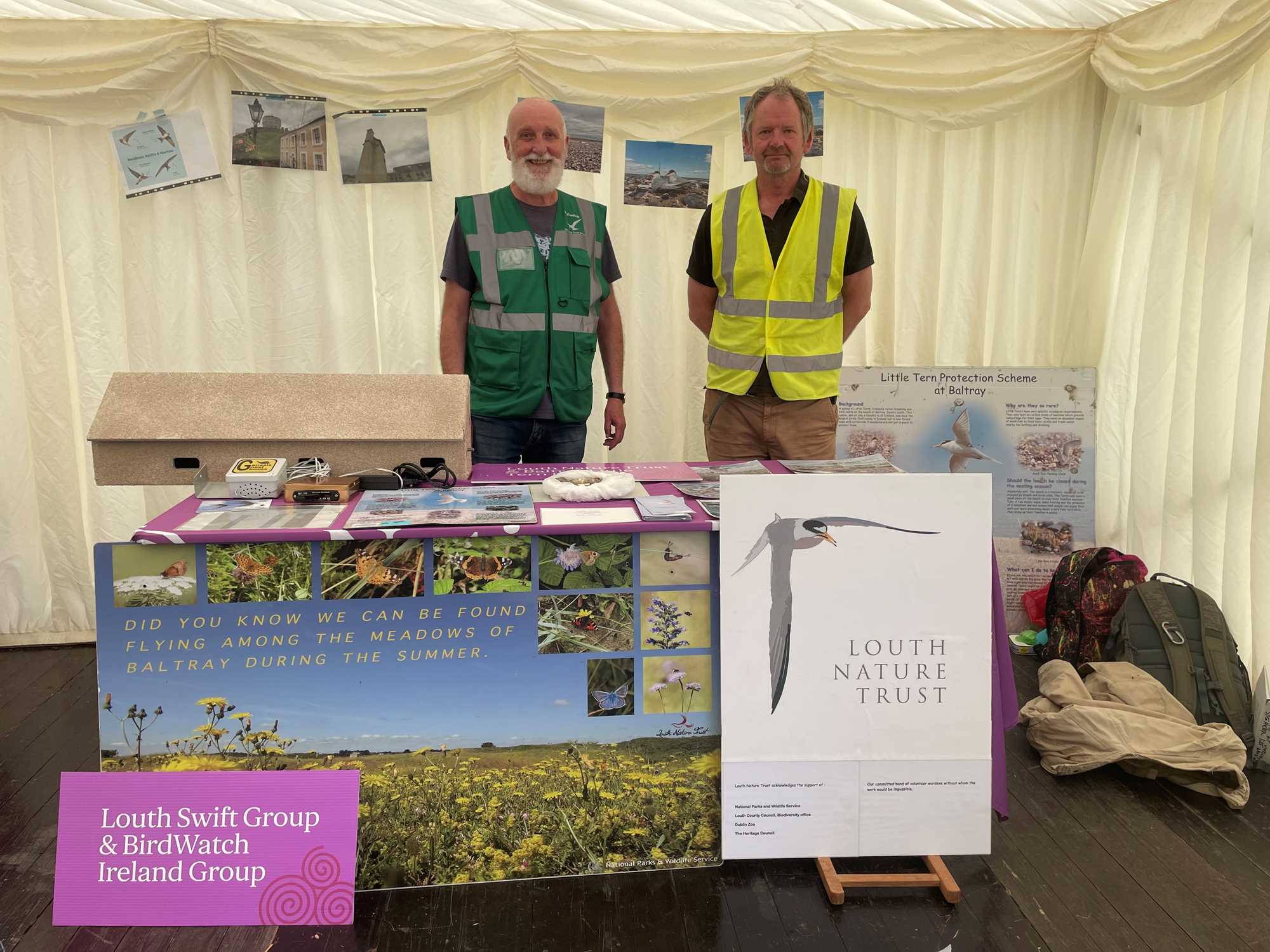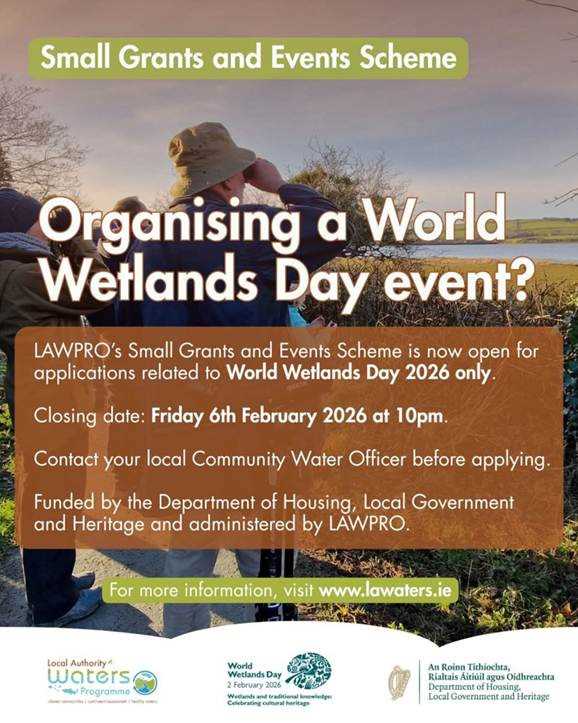
29/01/2026
World Wetlands Day 2026 - 2nd February
REGULATION (EU) 2016/ 679 OF THE EUROPEAN PARLIAMENT AND OF
THE COUNCIL - of 27 April 2016 - on the protection of natural
persons with regard to the processing of personal data and on the
free movement of such data, World Wetlands Day is on the 2nd February this year - there are many events: https://www.irishwetlands.ie/events/
And there is still time to organise your own with funding available from LAWPRO!
Breffni
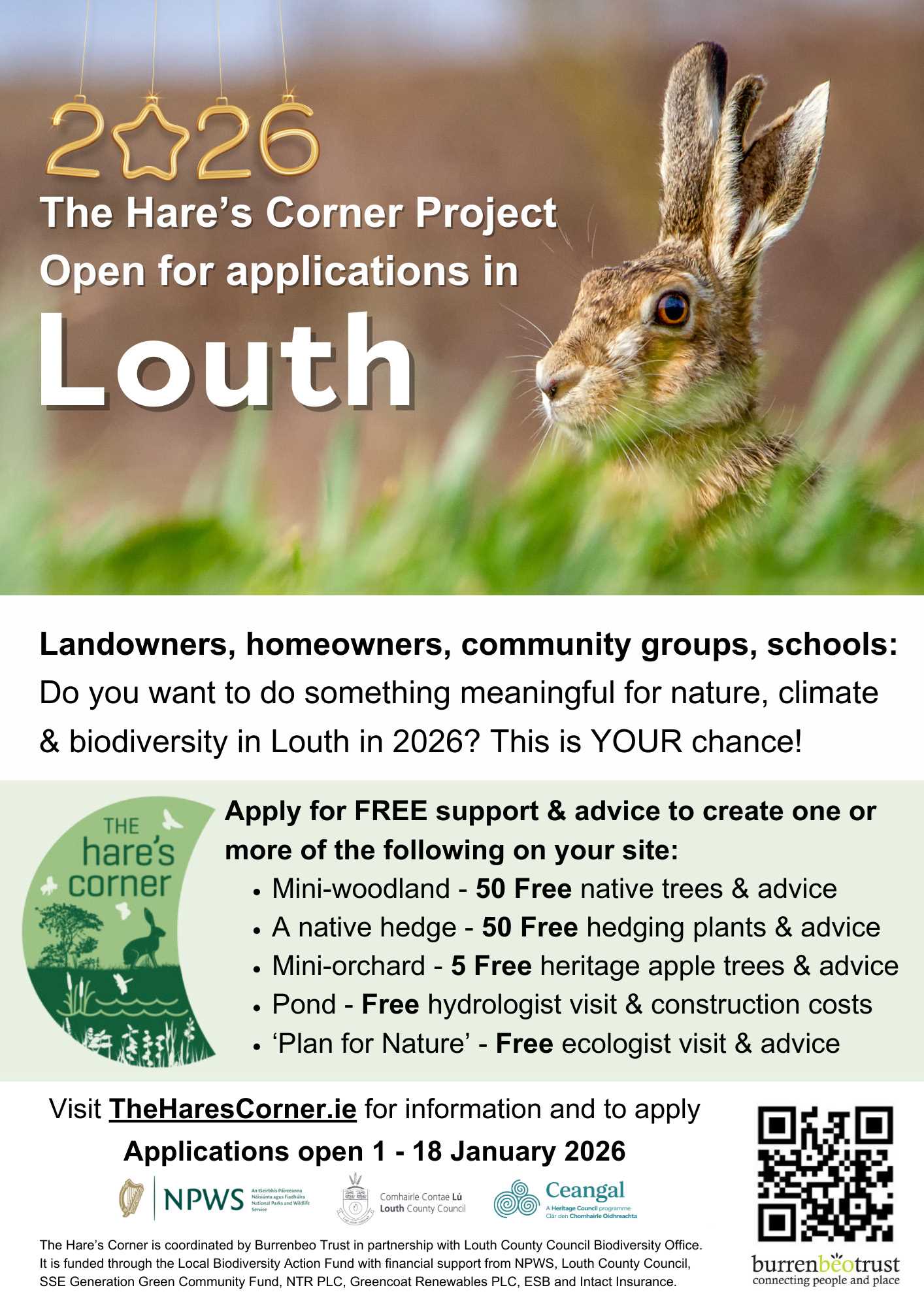
05/01/2026
The Hare's Corner Project
The Hare’s Corner is combating our climate and biodiversity emergencies with local, tangible, and achievable actions.
By offering landowners practical, hassle-free, support to enhance biodiversity on their land, this initiative has already delivered hundreds of new spaces for nature in the form of native mini-woodlands, wildlife ponds, heritage orchards and wildlife hedges.
See https://theharescorner.ie/
Breffni
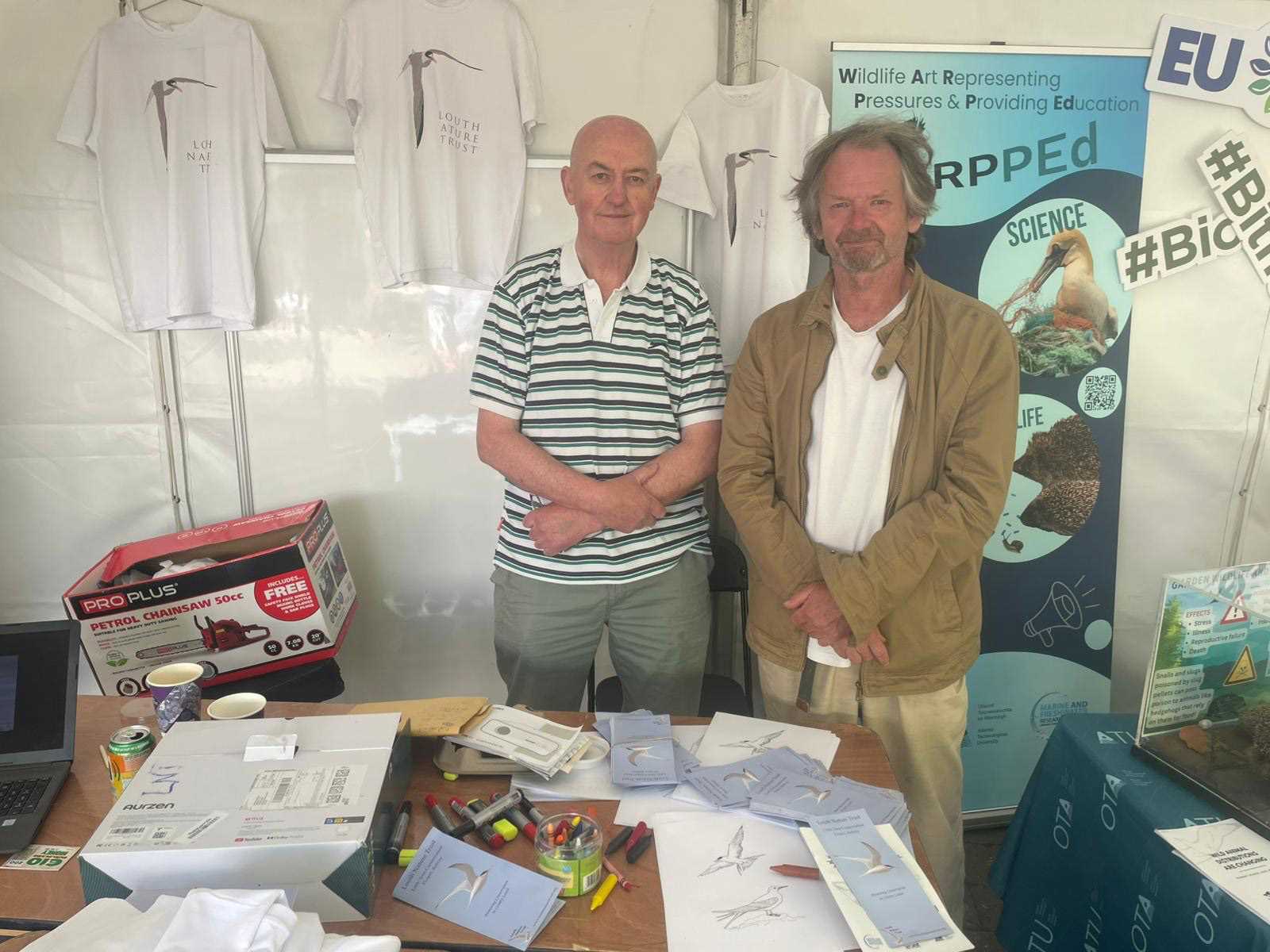
21/05/2025
A day at the Zoo
We had a good weekend at the native species exhibition at the Zoo, even managed to sell a few of our T-Shirts! it was also great to meet the many other conservation organizations around the country. Many thanks to Shannon, Dominic, Padraig for participating.
![]()
03/03/2025
Avian Influenza 2025
The ongoing bird flu epidemic continues. In summer 2022, the UK’s seabirds were hit extremely hard by bird flu hitting tousands of Gannets. Over 2,500 Great Skuas died in Scotland, as well as over a quarter of our Roseate Terns on Coquet Island, the only breeding colony of this species in the UK, Roakcbill was similarly hit. Againspring/summer 2023, we again saw devastating impacts on seabirds, including Black-headed Gulls, Guillemots, Kittiwakes and Herring Gulls, as well as significant impacts on terns; fortunately our colony of ittle terns at Blatray were largely unaffected.. Seabirds are long-lived, take several years to reach breeding age and rear only one or two chicks per year, so it is particularly difficult for them to recover from such an impact. F In winter 2022/23, up to 5,000 Greenland Barnacle Geese died on Islay, as well as hundreds of ducks, swans, gulls and other geese species. Birds of prey such as Peregrine Falcon, Hen Harrier, Buzzard, White-tailed Eagle and Golden Eagle have also been testing positive. The most recent series of bird flu outbreaks is the largest ever in the UK and worldwide and has killed tens of thousands of birds in the UK alone.
- A case of Highly Pathogenic Avian Influenza (HPAI H5N1) has been confirmed in a peregrine falcon in Co. Wexford.
- This is the fifth confirmed case of the virus in a wild bird in Ireland since December 2024.
- The Department of Agriculture Environment and Rural Affairs (DAERA) has confirmed the presence of HPAI H5N1 in wild birds across 3 separate counties in Northern Ireland.
- An Avian Influenza Protection Zone was introduced across Northern Ireland on 18th January 2025, which establishes similar mandatory biosecurity requirements as introduced by DAFM’s Avian Influenza (biosecurity measures) Regulations introduced on 6th December 2024, on all keepers of poultry and captive birds.
- From November 2024 to date, there have been 24 confirmed outbreaks of Highly Pathogenic Avian Influenza (HPAI) in poultry flocks and 3 in captive birds in England and 1 case in a poultry flock in Scotland (10th January 2025).
- Members of the public are reminded not to touch sick or dead wild birds.
- Poultry keepers are reminded to remain vigilant for any suspicions of avian influenza in their flocks, and to report such suspicions to their Regional Veterinary Office or the National Disease Emergency Hotline 01 492 8026 without delay.
Hopefully the disease will evolve in the same way as 2024, when incidences seemed to drop off as the breading season progressed.
![]()
01/03/2025
Restrictions on Cutting Hedgerows and Burning
Section 40 of the Wildlife Act 1976 prohibits the cutting, grubbing, burning or other destruction of vegetation growing on “any land not then cultivated” between 1st March and 31st August annually.
This is to protect bird life during the nesting season, to help prevent forest fires, and to protect vegetation and wildlife habitats during the months of growth and reproduction.
The legislation allows for some limited exemptions. For business, landowners and the general public the most notable of these exemptions are:
- The destruction, in the ordinary course of agriculture or forestry, of any vegetation growing on or in any hedge or ditch.
- The clearance of vegetation in the course of road or other construction works or in the development or preparation of sites on which any building or other structure is intended to be provided;
- The felling, cutting, lopping, trimming or removal of a tree, shrub, hedge or other vegetation pursuant to section 70 of the Roads Act 1993.
Suspected breaches of Section 40 of the Wildlife Act can be reported to WildlifeEnforcement@npws.gov.ie or your local NPWS office (see: Contact Us). Breaches of Section 40 of the Wildlife Act constitute a wildlife crime and may result in prosecution.
According to Section 22 of the Wildlife Acts it is also a criminal offence to wilfully destroy, injure, or mutilate the eggs or nest of a wild bird or to wilfully disturb a wild bird on or near a nest containing eggs or un-flown young birds at any time of the year.
The Wildlife Act 1976 is available to view and download.
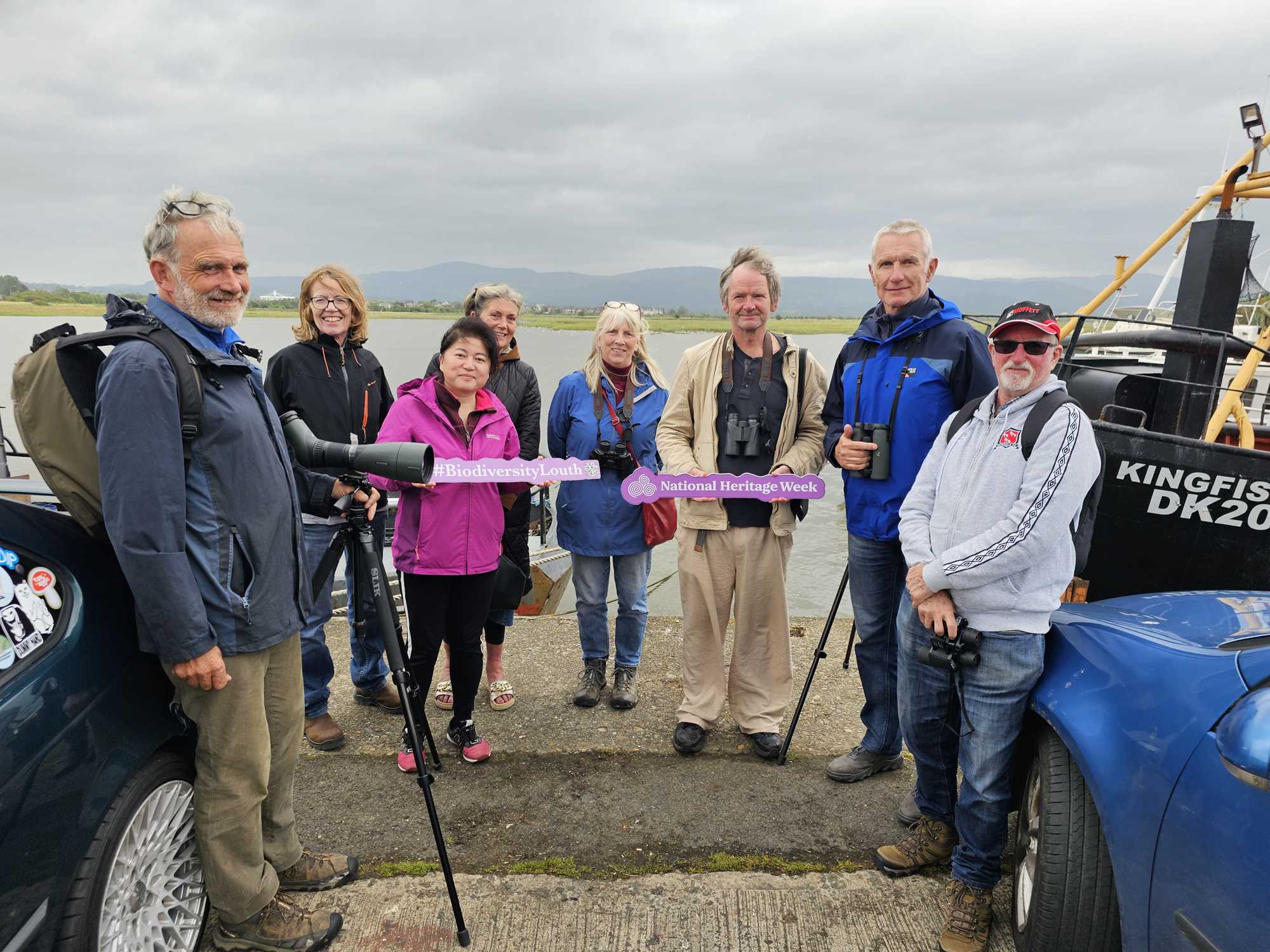
01/09/2024
National Heritage Week
National Heritage week 2024 was from 17th to 25th August with many events of heritage interest around the country. Our event this year was a talk on terns at the Spirit Store Dundalk Docks delivered by Breffni Martin.
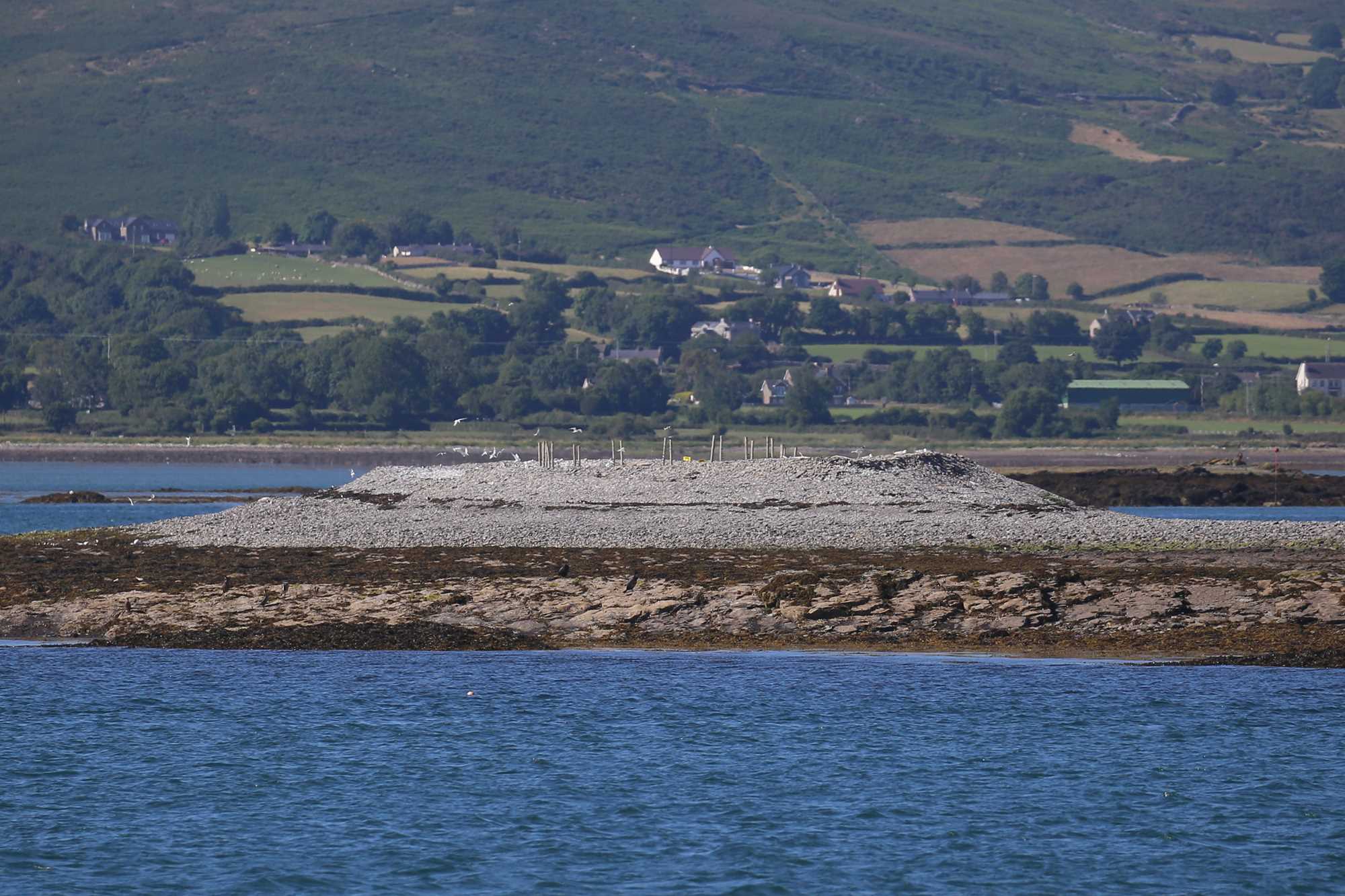
21/07/2024
Green Island
A small population of sandwich terns has set up to breed on Green Island in Carlingford Lough, arriving late (end of June) probably from a failed colony elsewhere. Over recent years attempted nesting on green island has consistently failed in recent years, mainly doe to the presence of large numbers of herring and great black-backed gulls, as well as over washing during spring tides. This may be exacerbated by the passage of the Seatrucks usually travelling at 20 knots up the lough. There are also several pairs of herring gull nesting in close proximity.
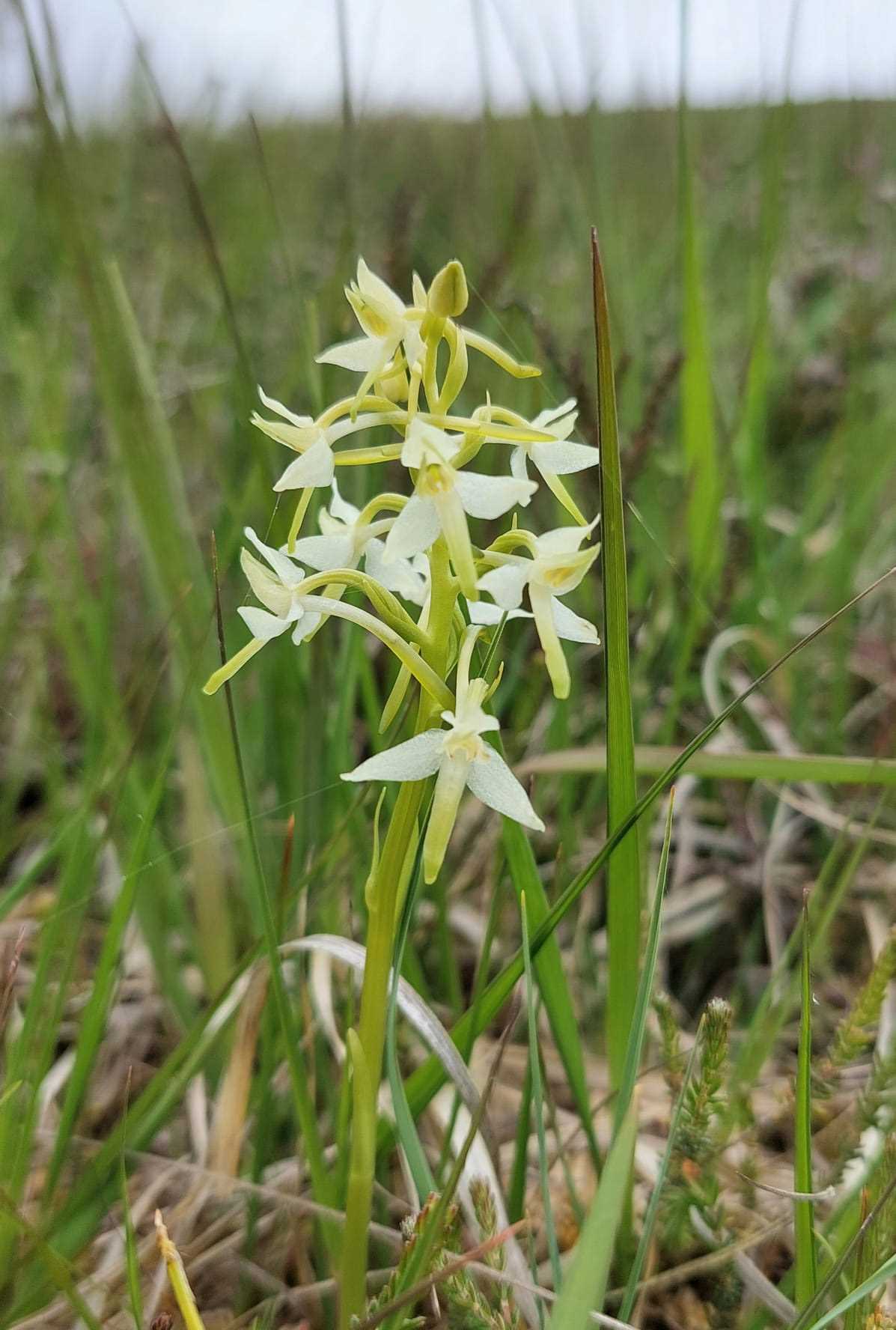
21/07/2024
Botany Update
Botanical team Ciaran and Enda Flynn have recorded an exceptional year for lesser butterfly orchids (Platanthera bifolia) with 39 specimens recorded at a regular site in the Cooley mountains this year. Ciaran discovered a new record for the county two years ago in the form of Killarney fern (Trichomanes speciosum) in the Cooley Mountains, written up in the latest edition of Irish Botanical News. Other finds over recent years include bog orchid (Hammarbya paludosa) one of our rarest wild flowers, and many others. Ciaran is a county recorder for the BSBI in County Louth.
Breffni
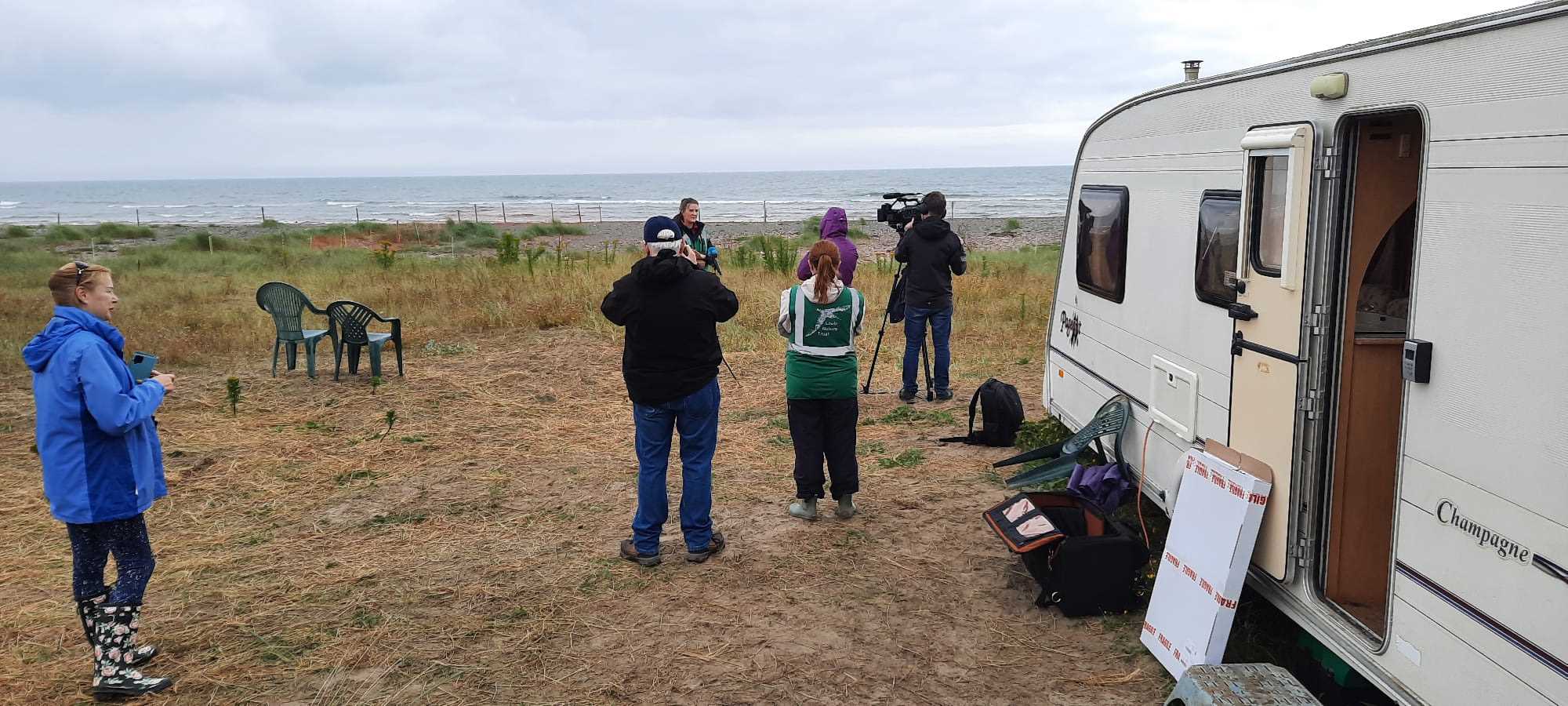
20/07/2024
RTE visitation to Little Tern site
On Friday morning 19th July we had a visitation from Laura Hogan from RTE to cover the news for the Baltray little tern site. She was shown around the site and fencing by Dominic and Bronagh, who outlined the huge volunteer effort that goes into the project. Fortunately this has been a very successful year, and may break previous records. The sotry is cered here on the RTE web site and will feature on the Six pm News on Saturday the 20th July.
https://www.rte.ie/news/leinster/2024/0720/1460881-little-tern-project/
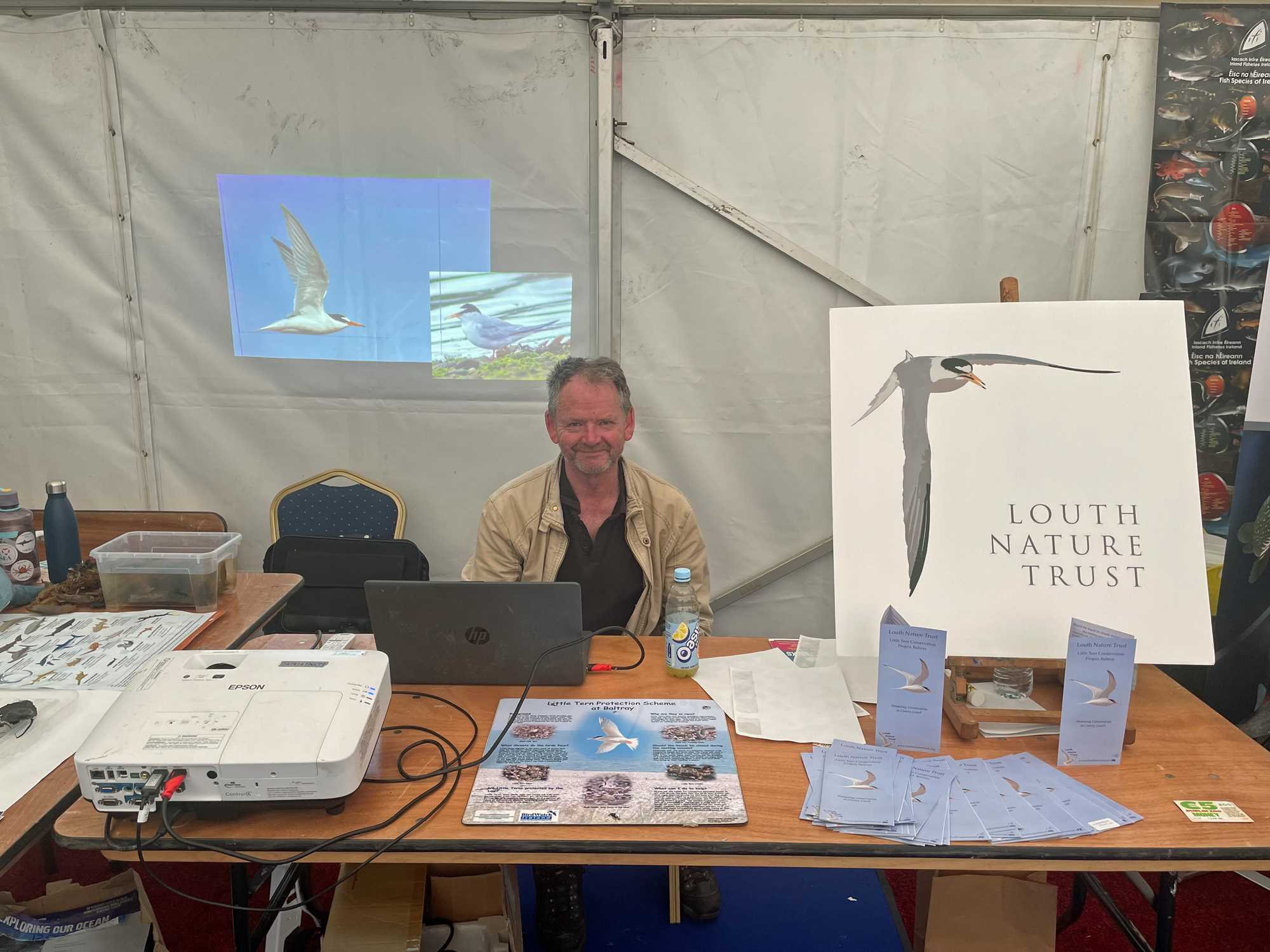
14/05/2024
A Weekend at the Zoo
We learned a few lessons at the Native Species Exhibition at Dublin Zoo, and will be better prepared next year with "merch" and colouring kits. Nevertheless, it was fun to meet the other exhibitors and to explain the project to various members of the public, even picked up a few volunteers. Thanks to all concerned!
Breffni
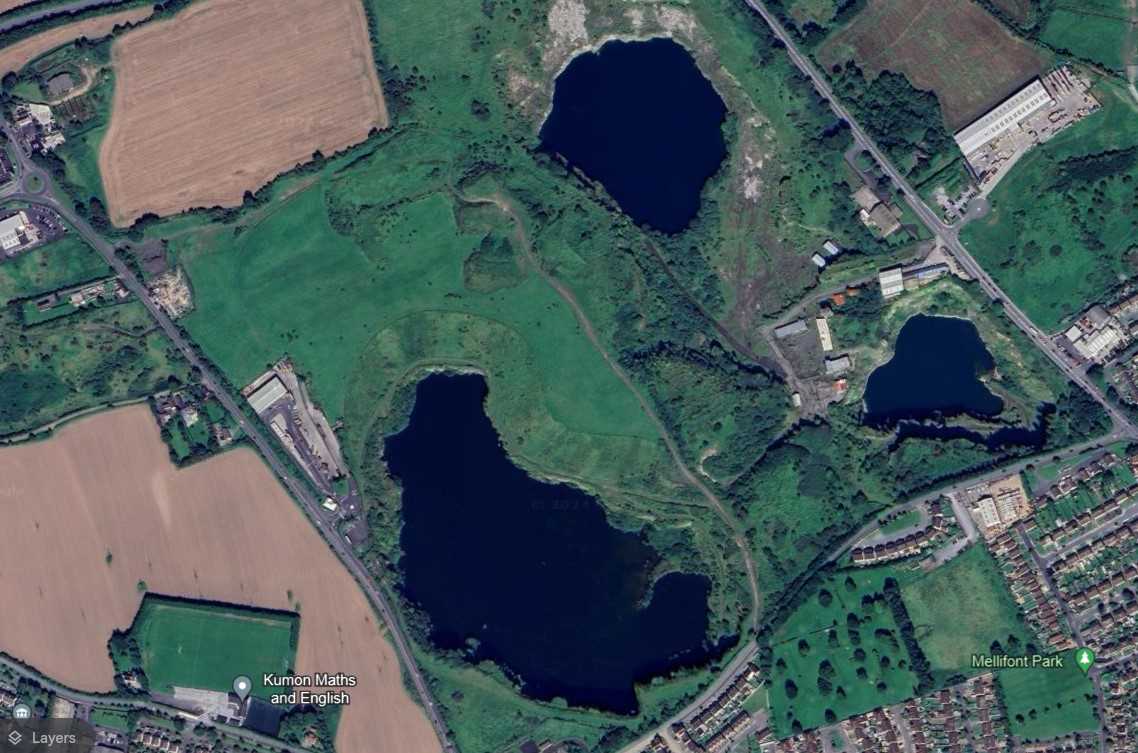
18/03/2024
Report on Mell Quarry by Tony Conaghy
Tony Conaghy has produced an excellent report on the ecology and threats to Mell Quarry - in our scientific publications section.
![]()
01/03/2024
Closed Season now in force
The National Parks & Wildlife Service (NPWS) of the Department of Housing, Local Government and Heritage is reminding the public the cutting, grubbing, burning or other destruction of “vegetation growing in any hedge or ditch” between 1st March and 31st August is prohibited.
The prohibition is contained in section 40 of the Wildlife Act 1976 . Suspected breaches are investigated by the NPWS and An Garda Síochána. The NPWS took 31 section 40 prosecution cases in 2021 and it hopes that fewer will be necessary this year.
In Ireland, our relatively low cover of native woodland makes our hedgerows exceptionally important for biodiversity. Hedgerows provide botanical diversity as well as food and shelter for animals, most notably birds. They also act as corridors connecting habitats. Untrimmed, thorny hedges are favoured by birds, but birds may nest in any hedge.
The prohibition outlined above does not apply (unless done by burning) in a number of circumstances set out in the Act. For businesses, landowners and the general public the most notable of these exemptions are:
- The destruction, in the ordinary course of agriculture or forestry, of any vegetation growing on or in any hedge or ditch. In the Act, “agriculture” is defined as including horticulture. Since horticulture includes gardening, the summertime trimming of hedges in the ordinary course of gardening falls under this exemption;
- The clearance of vegetation in the course of road or other construction works or in the development or preparation of sites on which any building or other structure is intended to be provided;
- The felling, cutting, lopping, trimming or removal of a tree, shrub, hedge or other vegetation pursuant to section 70 of the Roads Act 1993.
Otherwise, hedgerows are particularly vulnerable. If you have any concerns the first port of call is probably the Biodiversity Officer in Louth CC. For tree felling the forestry Service may be helpful: https://forestryservices.ie/tree-felling-licences/
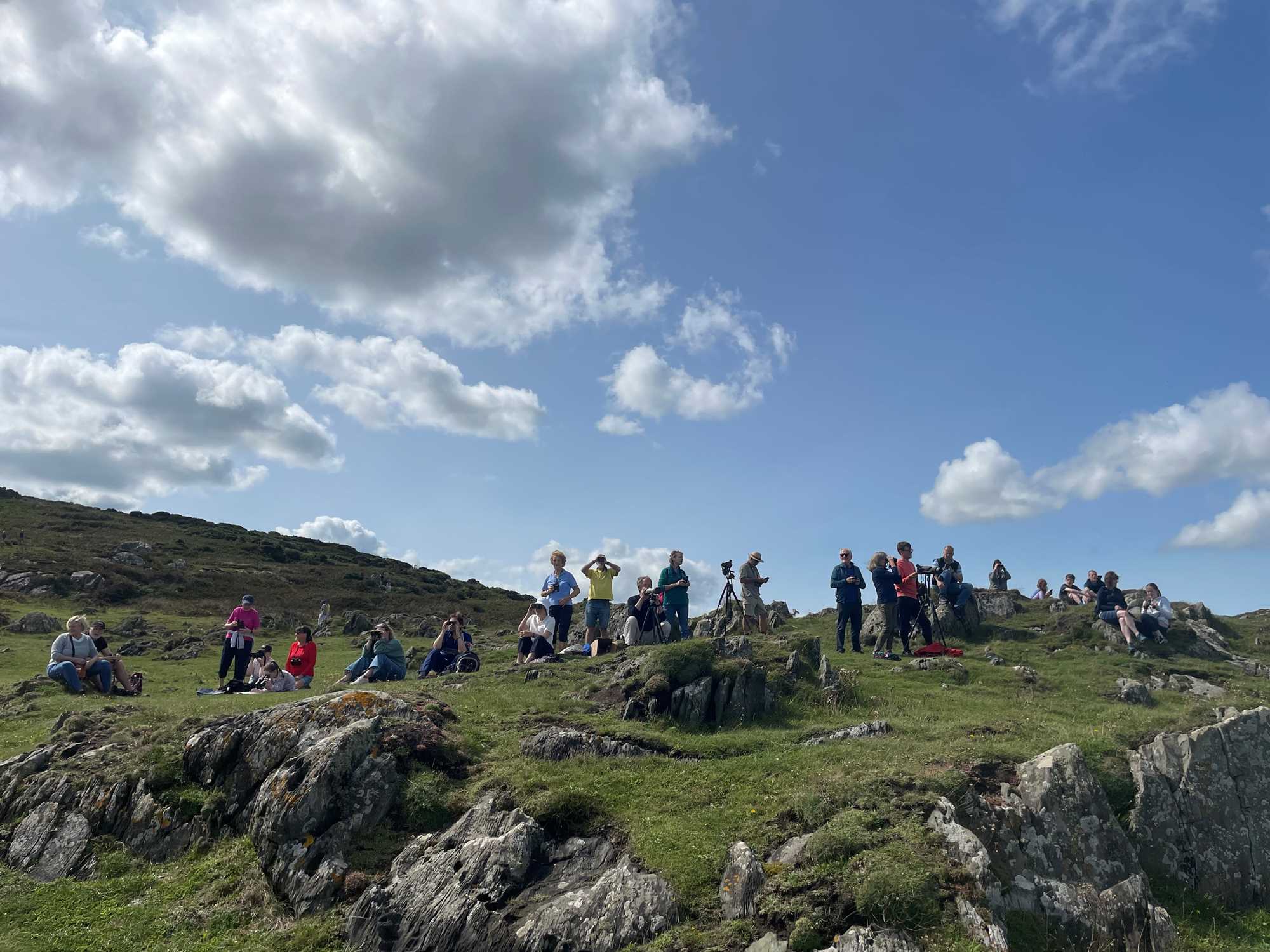
23/08/2023
Seawatching Clogherhead
Many thanks to the folks who showed up for the deferred seawatching event at Clogherhead last Sunday. On the day we had a pair of harbour porpoises who put up a bit of a show. Quiet otherwise except for a few guillemots, terns and a lone common scoter.
![]()
18/06/2023
Seagulls in Drogheda
A public meeting has been organised to discuss the problem of seagulls in Drogheda. Former councilor Frank Godfrey, who is organising the meeting, said: “The seagull problem is going from bad to worse as the year goes on. This summer for some unknown reason there seems to be thousands of them. I’ve been talking to a lot of traders and this is a problem that seems to be getting worse as the years go on, We all know they are noisy, but they are picking rubbish out of bins and making the streets look filthy, not to mention the bird droppings all over the streets and our historical buildings.
Mr Godfrey went on to say: "I’m not saying we harm them in any way, but I know some businesses have installed wild birds calls to chase them off, so maybe we need more of that in the town centre."
The two species concerned are Herring Gulls and to a lesser extent Lesser Black Backed Gulls. In summer particularly in June/July, Herring Gulls come into Drogheda to breed on the roofs of high building along the river and elsewhere (a favorite place is the roof of the Lourdes Hospital). This is because the high buildings are reminiscent of their normal habitat, which is sea cliffs. Gulls are also attracted to urban areas near the sea because of the huge feeding opportunities. Herring Gulls feed on fish in their natural habitat, however the species on which they feed have been largely fished out through over-fishing, making herring gulls red-listed in Ireland; so they need to find food elsewhere. They are also notable scavengers doing a great service in removing dead fish/mammals and the like from the shore. This means that they can survive very well on human rubbish, particularly discarded fast food (the location of McDonalds is very handy).
During breeding in June/July, Herring Gulls may become quite aggressive, defending nests and young but it is largely intimidation; gulls cannot really harm an adult, their beak cannot break skin etc. One way to deal with them is to intimidate them back by staring : https://www.allaboutbirds.org/news/when-gulls-attack-just-stare-back . Gulls are fascinating to study and are very intelligent: https://www.youtube.com/watch?v=Kqy9hxhUxK0. Observing gulls can be a great way to introduce people to wildlife in an urban. A study by NPWS suggested up to 360 herring gull nests and 24 lesser black backed gull nests in Drogheda: https://www.npws.ie/sites/default/files/publications/pdf/national_urban_gull_survey_project%20report.pdf
The obvious way to deal with the "problem" is to reduce the amount of rubbish available to them. Despite all their intelligence they cannot open properly closed wheelie bins. Burgers and chips should be put in bins with closure systems.
The meeting is at the d Hotel on Monday June 26.
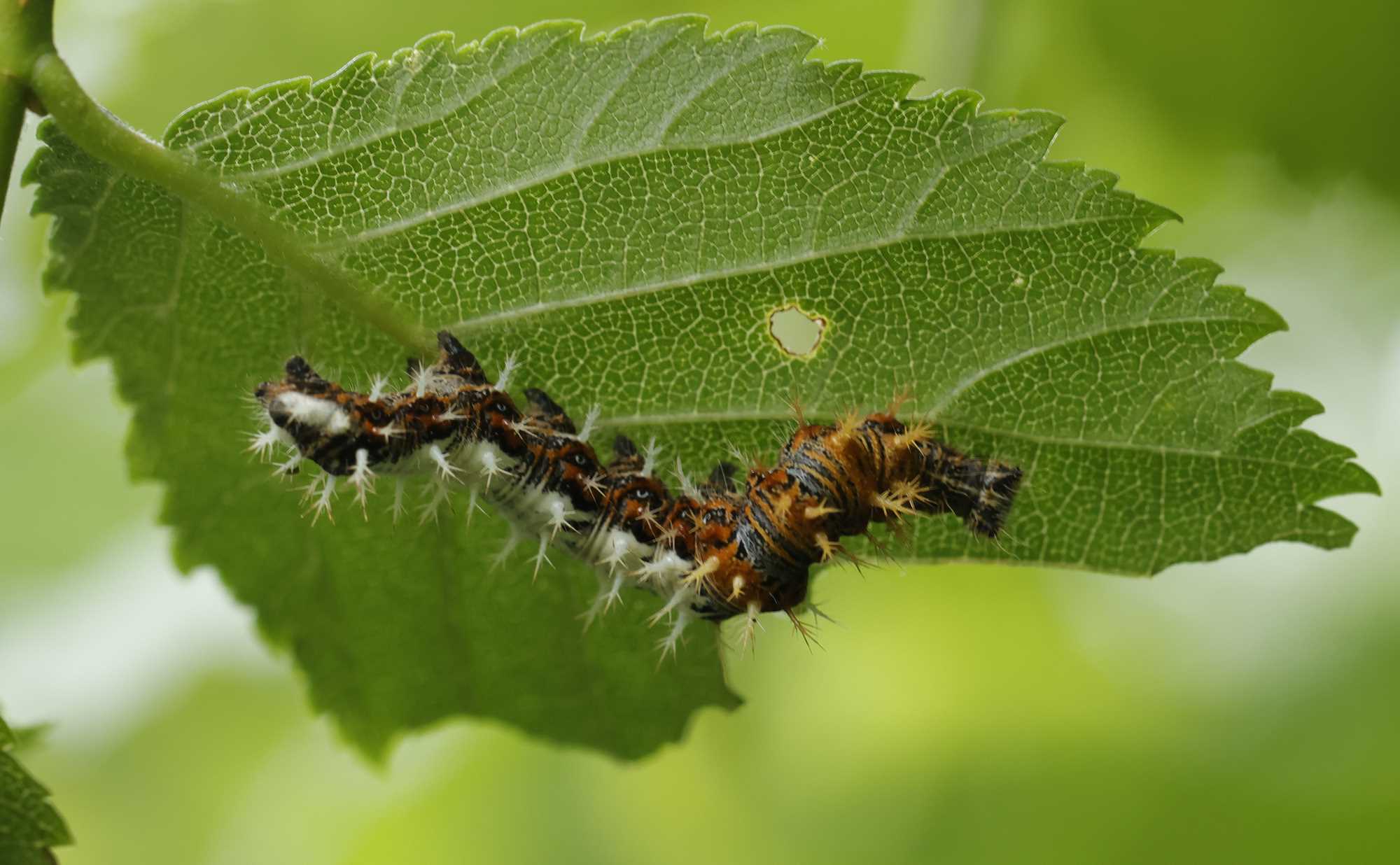
13/06/2023
Comma caterpillar found in Drogheda
Billy Clarke found a comma caterpillar in his back garden in Drogheda feeding on elm leaves. Commas are a recent arrival to Ireland largely driven by climate change. this is one of the most northerly confirmed breeding of the species in Ireland.
![]()
12/06/2023
Mournes, Slieve Gullion, Strangford Lough awarded full UNESCO global geopark status
Northern Ireland’s second ever UNESCO Geopark has been officially unveiled as Mourne Gullion Strangford covering three areas of outstanding natural beauty within Newry Mourne and District Council – Mourne, Ring of Gullion and Strangford Lough and Lecale. This was approved at a meeting of the UNESCO Executive Board in Paris last month. With a rich geological history across 400 million years, the new park has been described as ‘A Tale of Two Oceans,’ with the dramatic landscape formed by the appearance and disappearance of oceans, colliding continents and ‘tumultuous volcanic events’. A geopark is defined as a single unified geographical area that is managed holistically, in this case stretching from the waters of Strangford across the Mourne Mountains to the Ring of Gullion. https://www.irishnews.com/news/northernirelandnews/2023/05/25/news/mourne_gullion_strangford_awarded_full_unesco_global_geopark_status-3303645/
The mystery in this story is why the Cooley mountains are not included in this Geopark, since the Cooleys are an integral part of this geological system!
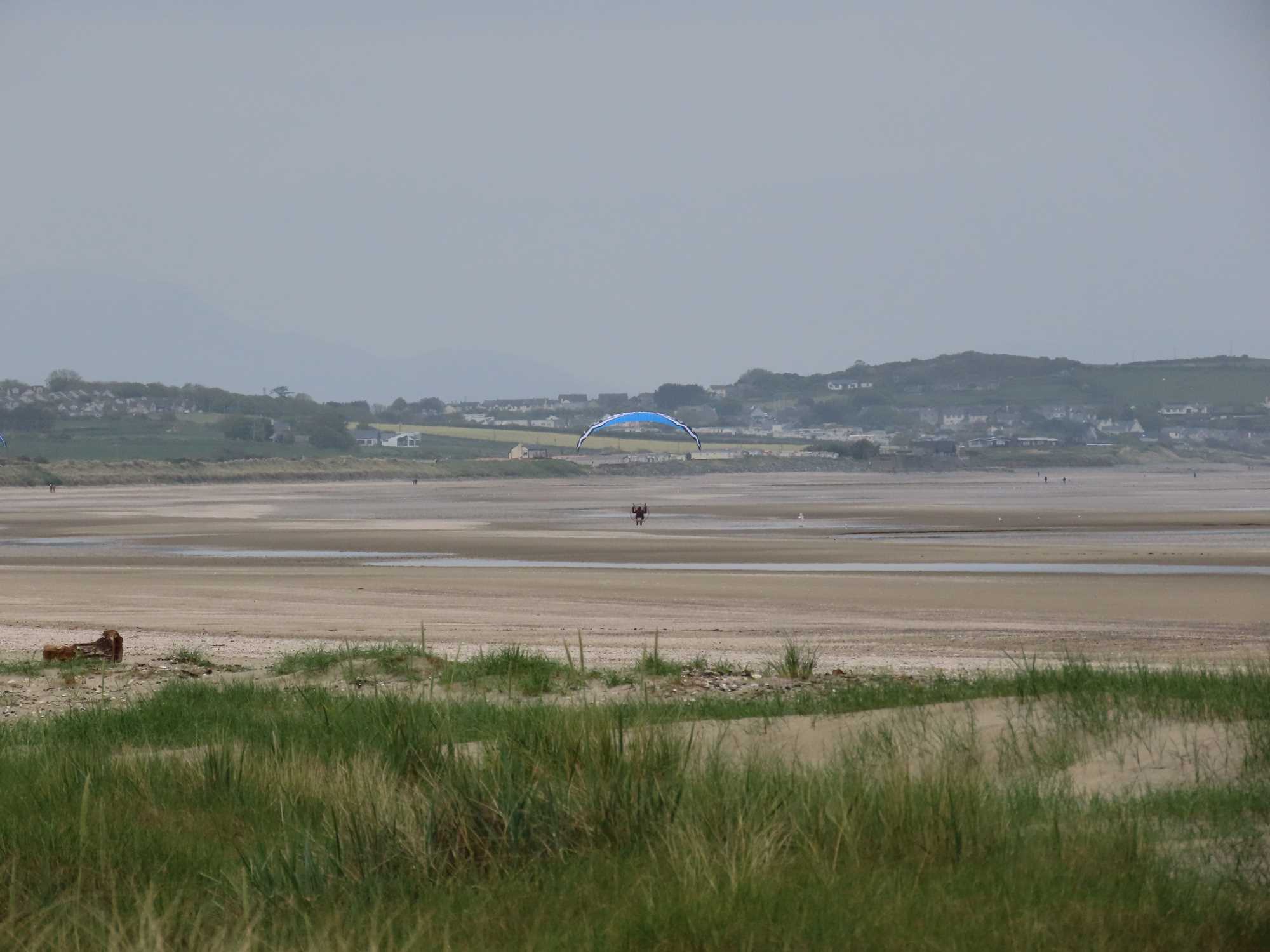
25/05/2023
Paramotoring
We have has several incidents of para motoring over the little tern enclosure. Paragliders may not be aware of the impact this may have on the ground nesting birds, who may be incubating eggs or brooding young. This may impact breeding success and if regular may cause birds to abandon a nest..
We would ask them to please avoid the beach area just north of the Boyne over the summer months, noting that it is a criminal offence under the Wildlife Act to disturb birds in a nesting place.
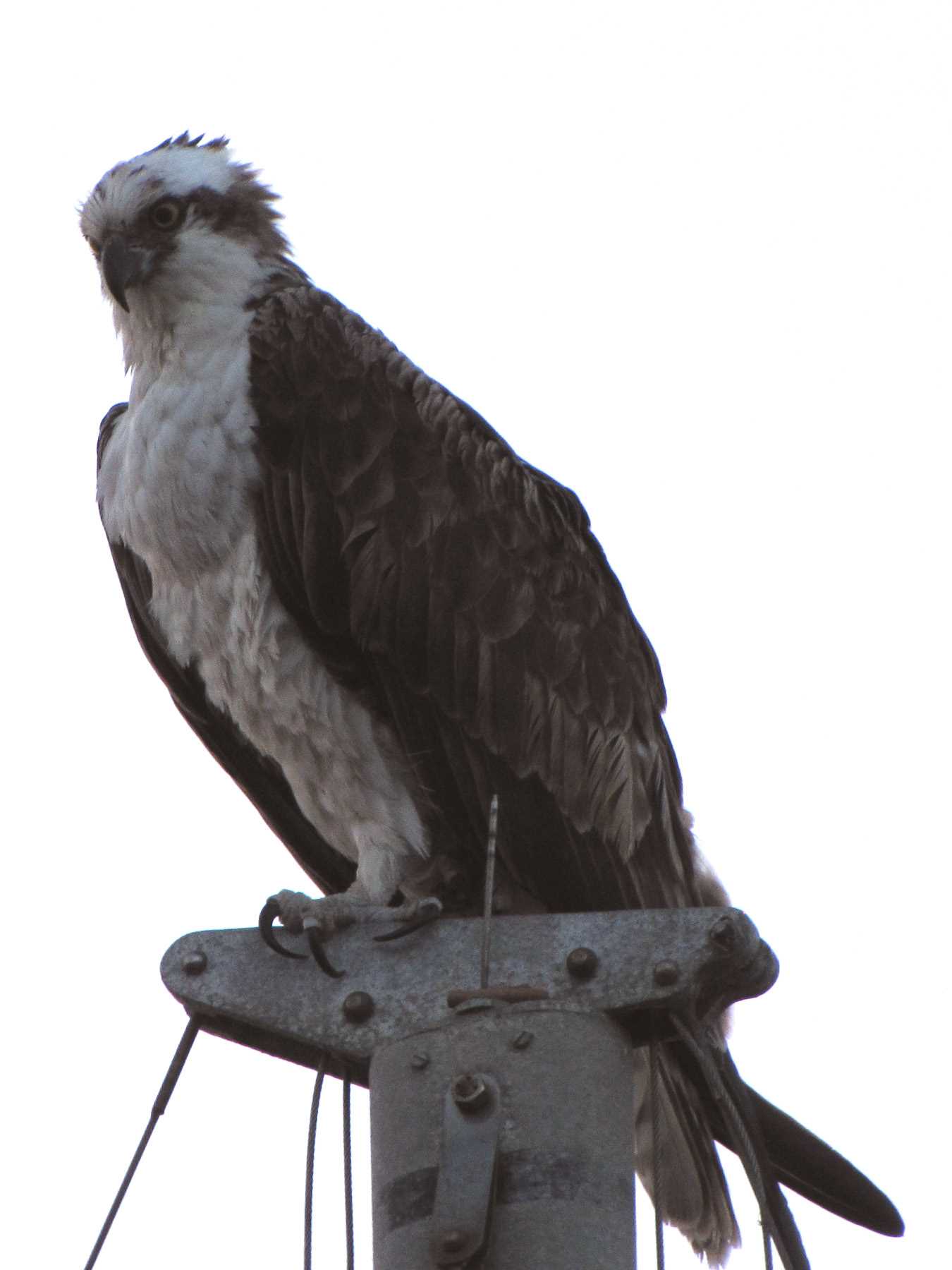
24/05/2023
Return of the Osprey
The NPWS is working with the Golden Eagle Trust to reintroduce the osprey (Iascaire Coirneach - is the Irish name (meaning 'tonsured fisherman') to Irish waterways and lakes this year. Osprey are a magnificent fish-eating bird of prey that became extinct in Ireland many years ago. The NPWS has been researching and preparing for the potential reintroduction of these birds for a number of years and now expects to reach a significant milestone with the arrival of the first 12 Osprey chicks in July. The reintroduction programme aims to establish a viable, free-ranging Osprey population that eventually breeds in Ireland. Over the next five years 20 to 30 chicks from Norway will be reintroduced. https://www.gov.ie/en/press-release/55804-return-flight-for-the-osprey-as-national-parks-and-wildlife-service-prepares-to-reintroduce-bird-to-ireland-this-summer/
![]()
18/05/2023
Bird Flu Unlikely to Affect Humans
A bird flu epidemic has been circulating the globe for the last two years, decimating wild birds, particularly colonial seabirds. According to a report by the BBC poultry workers who were exposed to bird flu in the UK adn even tested positive for virus in their nasal cavity, did not get infected or experience any symptoms. https://www.bbc.com/news/uk-65615772
Nevertheless care should be taken if handling potentially affected birds, such as face mask and gloves. It is known that a proportion of birds survive the disease (if gannets their blue irises turn black).
If you come across any cases please report to the department: https://birdwatchireland.ie/birdwatch-ireland-urge-people-to-report-any-signs-of-bird-flu-in-their-area/
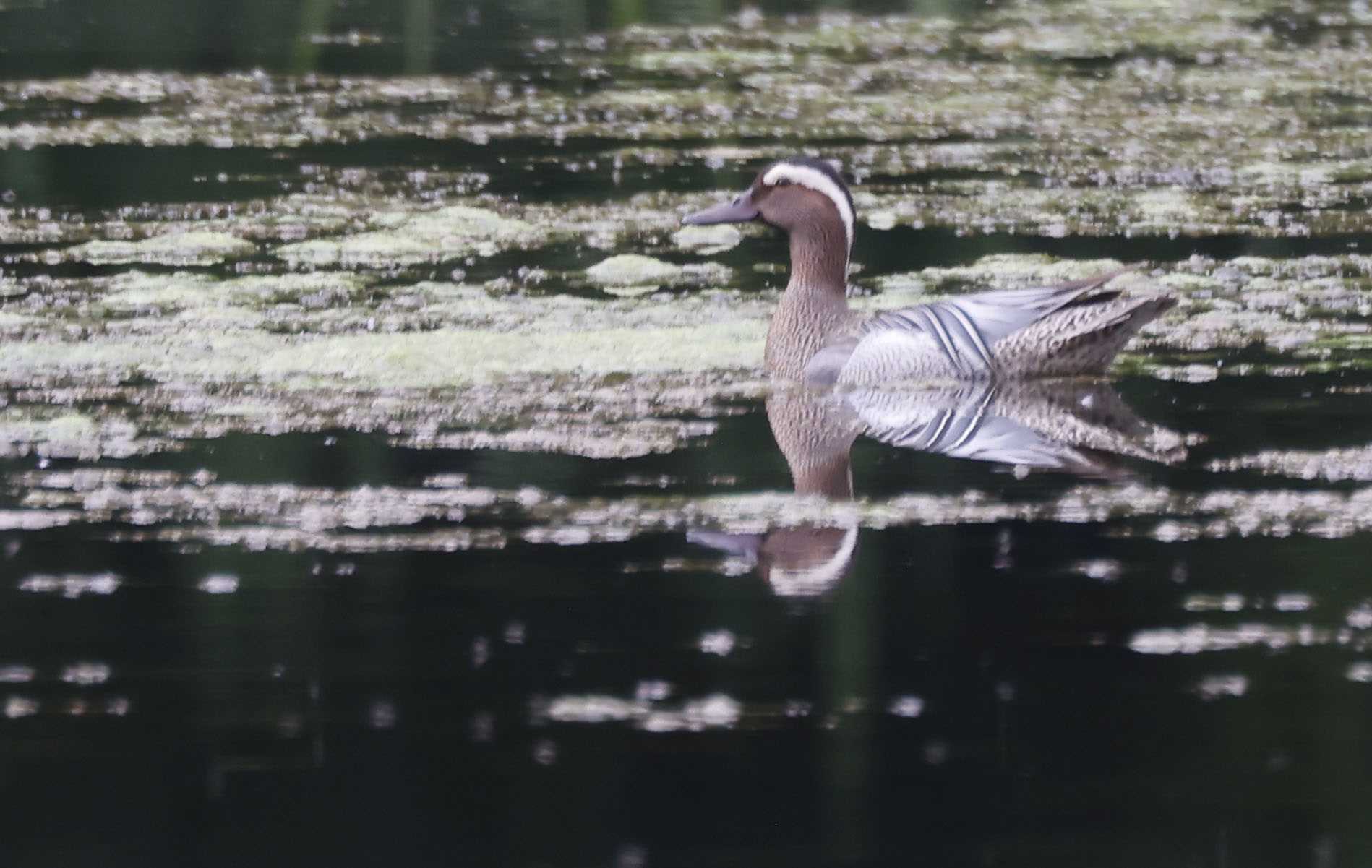
17/05/2023
Bird News
A couple of recent unexpected visitors to the Boyne estuary were a common scoter and a garganey.
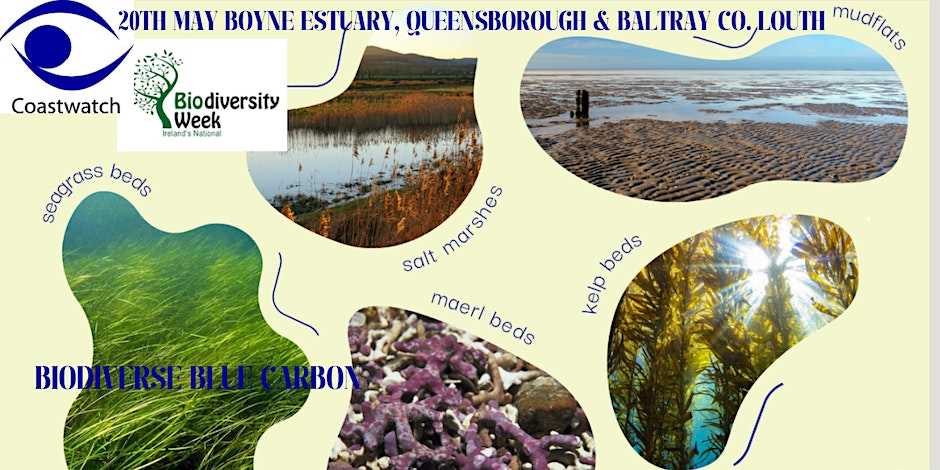
17/05/2023
Coastwatch fieldtrip
Join us for this Biodiversity Week fieldtrip on the protected Boyne Estuary. Discover its unique history, status today and opportunities for restoration of this biodiverse blue carbon site.
Coordinator, Karin Dubsky will be joined by experts including Brendan McSherry, Heritage Officer, Co. Louth and Aina Walsh.
Meet at the gate of The Haven at 2pm, follow road past golf club.
Please bring wellies, appropriate clothing such as anorak and water.
We wish to thank the Irish Environmental Network for their support for this event.
Coastwatch is piloting a new theme - Cool Biodiverse Blue Carbon (CBBC) into its 2023 Biodiversity fieldtrips and events around UN World Biodiversity Day May 22nd
From May 18th to 28th we will be exploring the coastal rim from barely land through intertidal to shallow sublittoral. It includes our beautifully flowering saltmarshes and rare coastal wet woodlands and bogs, intertidal mudflats and peat, mussel and seagrass beds and meadows, kelp forests.
Join us for a free fieldtrip near you to identify these habitats, look into their biodiversity and carbon storage value, share observations on habitat health and historic presence, consider pressures, protection and restoration. Results from fieldtrips will be pooled to draft a first CBBC leaflet for Irish shores. Participant local and traditional knowledge on wise use and protection is particularly welcome.
![]()
16/04/2023
Coke is the thing
A big thank you to the local Coca Cola operation for their generous donation to the Louth Nature Trust, in support of the Little Tern Conservation Project!
![]()
16/04/2023
First Swallows
The first swallows arrived on Saturday 5th of April, across the county, about bang on time vis-à-vis previous years. Other arrivals were sandwich terns, chiffchaffs, willow warblers, and first wheatear in a wave at about the same time.
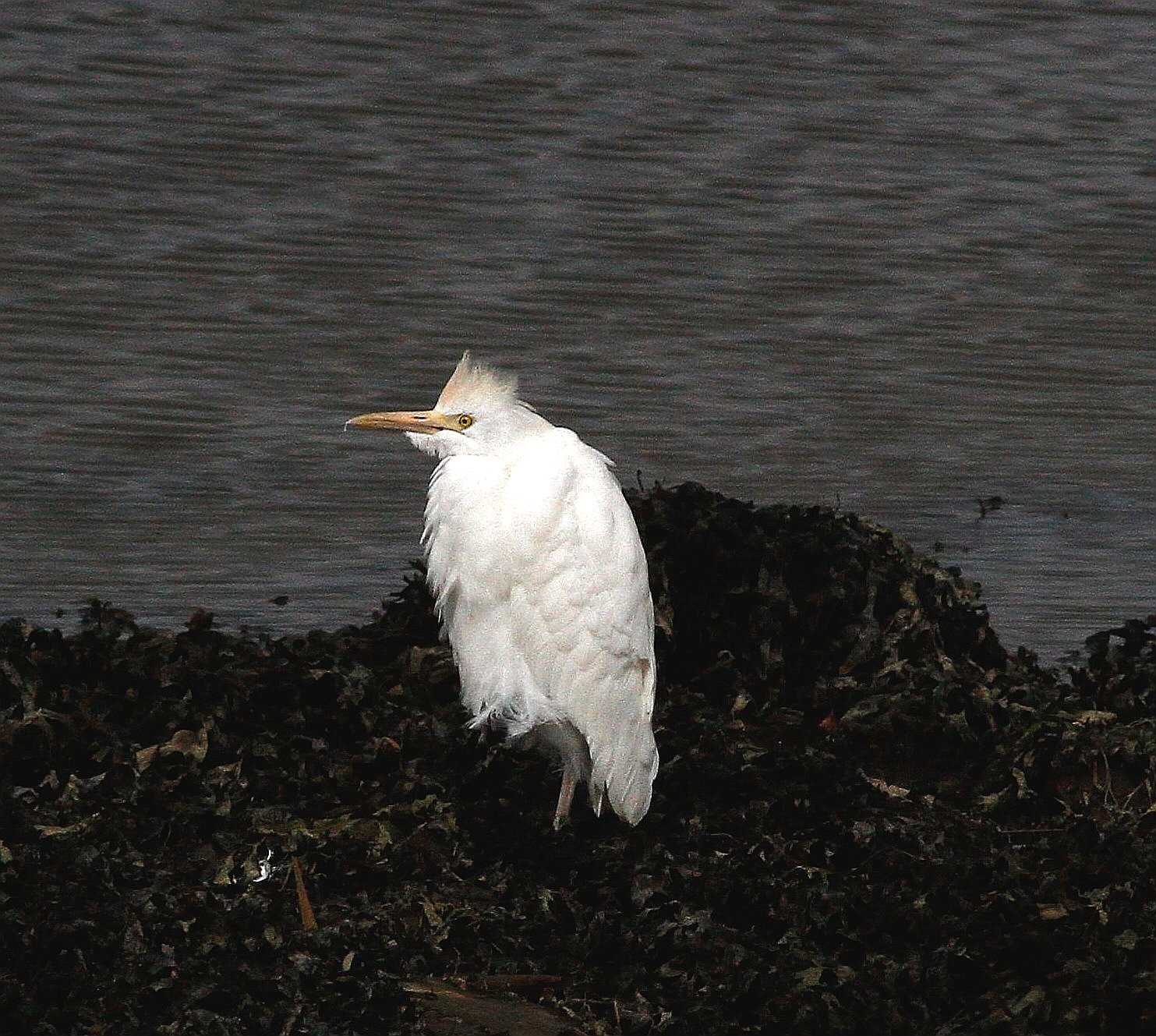
04/04/2023
Cattle Egret visitor
A rare cattle egret has been putting on a show along the Castletown rive in Dundalk over the last week or so. First found by Gerry O'Neill, the bird is best seen at low tide around Dixons/Applegreen on the Castletown river bridge. Cattle egrets used to be a great rarity bus t in recent years have been showing up more often, and like their cousins, the little egrets, they are harbingers of global warming. Normally they can only tolerate Mediterranean climate but with the lack of frost in Ireland they are increasingly able to survive early in spring, and likely will soon breed.
![]()
28/03/2023
Louth Nature Trust AGM 2023
The AGM was held on the 13th March 2023 with the full board in attendance and Eanna Ni Lamhna chairing.
All members were reelected and the auditors were reappointed.
Draft financial results up to end 2022 were reviewed. The Trust continues to receive good funding front the Heritage Council, and donations from others, in particular Coke Inc and The Dublin Zoo.
The Baltray little tern report was reviewed, as well as other conservation operations, in particular new nesting boxes for black guillemots made of MgO plates and installed at Greenroe breakwater experimentally. the little tern season was particularly successful on a number of fronts.
Acknowledgement was made of the enormous work contributed by out team of volunteers, without whom these projects could not happen.
Once again we would welcome anyone who may be interested in joining the board and getting more involved in Louth wildlife conservation.
Breffni Martin
Secretary
![]()
28/03/2023
Louth Bird News February 2023
Notable were some Russian white fronted geese in Ardee, cattle egrets same location. A firecrest was reported in Dundalk. A black necked grebe adn slavoinain grebes showed a few times in dundalk bay, along with a few long tailed ducks. An Iceland gull and two Siberian chiffchaffs were found in in Dundalk. S spotted redshank continues to be regular at the docks, along with several ruff comin
![]()
01/03/2023
Restrictions on Cutting Hedgerows, Weed-killer, and Burning 1st March 2023
Restrictions on cutting hedgerows are set out in Section 40 of the Wildlife Act 1976 as amended by the Wildlife (Amendment) Act 2000 and the Heritage Act 2018. These Acts stipulate that it is an offence to destroy vegetation on uncultivated land between the 1st of March and the 31st of August each year. This information has already been circulated to local authorities.
There are exemptions to this restriction and these can be read at the link below to the Consolidated Version of S40 of the Wildlife Acts.
f you wish to make a complaint in relation to illegal damage to vegetation please do so in writing to natureconservation@npws.gov.ie or contact your local Garda station.
If you wish to make a Report in relation to illegal damage to vegetation please do so in writing to natureconservation@npws.gov.ie with the Subject Heading “Hedge Cutting” or you can contact your local Garda station. If you don’t have access to email and wish to make your Report in writing, please mark them “Hedge Cutting” and post/drop in to:
Department of Housing, Local Government and Heritage
National Parks and Wildlife Service
90 King Street North
Dublin 7
D07 N7CV
https://www.npws.ie/legislation/irish-law/restrictions-cutting-hedgerows






